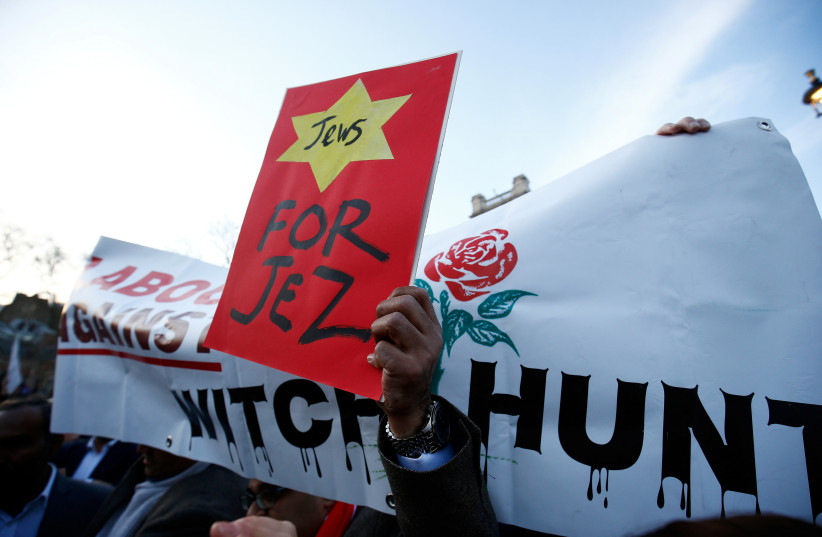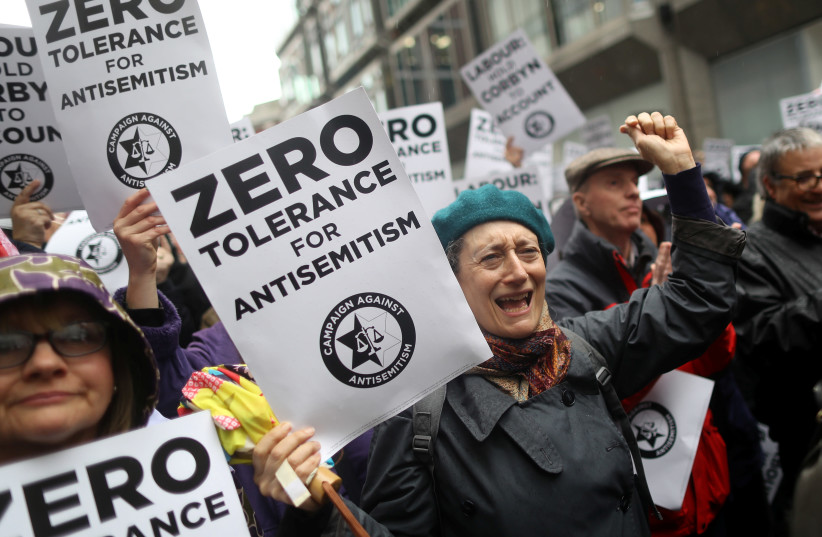Allegations and acts of antisemitism within the British Labour Party were weaponized by all factions within the party under Jeremy Corbyn's leadership, the Forde Inquiry has revealed in a 138-page document published on July 19.
Antisemitism and denialism within the Labour Party
The Forde Inquiry found that there was a "vociferous faction" within the Labour Party that saw any allegations or incidents of antisemitism to be an exaggeration of "the Right" created to embarrass "the Left."
Despite the acknowledgment of the antisemitism problem by many in the party following the involvement of the Equality and Human Rights Commission, "some still deny the existence and seriousness of the problem, or the need to take action to combat it," Forde states.
At the same time as staunch supporters of Corbyn's leadership weaponized antisemitism by minimizing its presence, Party members opposed to Corbyn's leadership also weaponized the allegations, the report continued.
"It was of course also true that some opponents of Jeremy Corbyn saw the issue of antisemitism as a means of attacking him," the report states. "Thus, rather than confront the paramount need to deal with the profoundly serious issue of antisemitism in the party, both factions treated it as a factional weapon."

The report stresses that "taking sides" is not always wrong, but rather that "the taking of sides should be based upon reason, and should not be motivated by blind loyalty or irrational and entrenched opposition to a member, or leader, of a perceived tribe."
"Rather than confront the paramount need to deal with the profoundly serious issue of antisemitism in the party, both factions treated it as a factional weapon."
Martin Forde
Expanding on the themes of denialism that emerged from the investigation, the report calls the denialism troubling, and states that it was found "principally amongst some of Jeremy Corbyn's supporters in relation to antisemitism, but was also evident more widely across all factions of the Party in relation to issues of race and gender."
The factions involved in weaponizing antisemitism, whether as a means to defend or attack Corbyn, "failed to recognize the seriousness of antisemitism, its effect on Jewish communities and on the moral and political standing of the Party," the report states.
Jeremy Corbyn responds
Responding to the Forde Inquiry findings, Corbyn took to Facebook with a statement that avoided all mentions of antisemitism.
Instead, he states that "despite overwhelming support from members and affiliates, powerful groups in the party found that change hard to come to terms with. This led to a conflict in Labour that created a toxic environment, which the Forde Report lays bare."

He continued, avoiding any mention of the weaponization of antisemitism by his supporters, choosing instead to only mention "the appalling behavior that Forde calls out, including the repulsive racism and sexism shown to Diane Abbott and others."
In conclusion, Corbyn says that "most of all, the Party needs to decide what it is for and who decides that. Are we a democratic socialist party, run by members and affiliated unions, that aims for a fundamental transfer of wealth and power from the few to the many? Or are we something else?"
Jewish community responds
"Under Keir Starmer, there has been a marked improvement in the seriousness with which Labour treats incidents of antisemitism, but we continue to stress that there is more to be done."
Board of Deputies of British Jews President Marie van der Zyl
Responding to the Forde Inquiry, Head of Political and Government Investigations at Campaign Against Antisemitism, Joe Glasman, stated that "in one area, the Forde Report is clear. It confirms that contrary to Jeremy Corbyn’s claim, antisemitism in the Party was not exaggerated. Sir Keir Starmer needs to act on that information and expel him."
However, he continues "most of the report is of no use. Taking even-handedness to an absurd extreme, the Report tries to criticize and defend both ‘sides’ in Labour’s antisemitism scandal equally. One ‘side’ was filled with antisemites and their enablers. The Report failed to grasp this elemental truth, rendering it useless."
The Report offers neither explanations nor remedies," Glasman concludes. "Until we see our complaints addressed, we are unable to have confidence in the Party’s leaders and processes, let alone its culture.”
Also responding to the report was Board of Deputies of British Jews President Marie van der Zyl, who specifically notes the report's concern regarding the Jewish Labour Movement and Jewish Voice for Labour.
“Under Keir Starmer, there has been a marked improvement in the seriousness with which Labour treats incidents of antisemitism, but we continue to stress that there is more to be done," she says. "The Jewish community is still deeply affected by the way in which antisemitism was allowed to flourish, all but unchecked, within the Labour Party during Jeremy Corbyn’s leadership.
“The Forde report explicitly regrets that ‘some still deny the existence and the seriousness of the problem’ of antisemitism within Labour. Given this, we are troubled by the authors’ later expression that they are ‘disappointed’ that ‘Jewish Voice for Labour’ – an extreme fringe far-left organization that has obsessively denied antisemitism within the Labour Party – has not been granted a role in educating Labour members on antisemitism. This is clearly a backward step and the authors of the report need to clarify their position on this matter.”
Jewish Labour Movement vs Jewish Voice for Labour
During the section of the Forde report entitled "The Culture, Structure, and Practises of the Labour Party Organization," the report brings up the two competing Jewish community factions within the Labour Party: The Jewish Labour Movement and the Jewish Voice for Labour.
The Jewish Labour Movement was formed in 1903 and is one of the oldest socialist movements affiliated to the UK Labour Party and is also connected to the Israeli Labor Party and Meretz. One of their fundamental objectives is to "maintain and promote Labour or Socialist Zionism as the movement for self-determination of the Jewish people within the state of Israel."
The Jewish Voice for Labour, on the other hand, was established in 2017 with the aim of upholding "the rights of supporters of justice for Palestinians to engage in solidarity activities," and to "oppose attempts to widen the definition of antisemitism beyond its meaning of hostility towards, or discrimination against, Jews as Jews."
The Forde Inquiry report states that while they "recognize the key role of JLM as a longstanding affiliate of the Party and welcome the impetus they have provided in setting up antisemitism education but...we have our criticism of the form that education has taken.
"However, we do recognize that there are other voices amongst Jewish communities and Jewish members of the Party. Hence we are disappointed that there has been a refusal to engage at all with Jewish Voice for Lavour's proposal for antisemitism education."
The Forde Inquiry
The Forde Inquiry was commissioned by current Labour Party leader Keir Starmer after an 860-page report on Labour's handling of antisemitism claims was leaked to the press in April 2020. The original report, entitled "The work of the Labour Party's Governance and Legal Unit" was intended to be submitted to the Equality and Human Rights Commission but this never happened, and it was instead leaked to the press.
The independent inquiry subsequently commissioned by Starmer and led by Martin Forde aimed to focus both on the content of the leaked report, which he said contained deeply derogatory messages, but also on the circumstances surrounding the leak and the breach of privacy of those involved.
Between June 2020-August 2020, Forde established a formal Call for Evidence which allowed for Labour Party members to submit their input on the matter. The Call for Evidence received over 1,100 submissions from people across the entire party, with Forde saying that "we were clear from the outset about the importance of hearing a wide range of views from across the Party, to help provide balance."
Following the Call for Evidence, Forde, along with his team began to sort through the submissions, taking note of key themes and patterns emerging from the thousands of pages worth of accounts.
In the report, Forde describes the submissions as making for "challenging reading," adding that "many of those who contacted us complained of discrimination across the whole range of protected characteristics, as well as various kinds of bullying and harassment at a local level.
"Depressingly," he continued, "we were provided with a wealth of evidence (both oral and written) regarding the perceived widespread existence of discriminatory behaviors, based on religion, race, gender, and sexual orientation."
The evidence collected, the report states in its damning summary, made it clear that the Party's morals of diversity and inclusion were not being fully respected and met.
"We found little evidence of mutual respect and a great deal of evidence of factionalism, so deep-rooted that the Party has found itself dysfunctional," the report states, before summarizing the key themes that emerged from the months-long investigation, which included items such as toxic workplace culture, difficulty establishing evidence, and the weaponizing of antisemitism.
